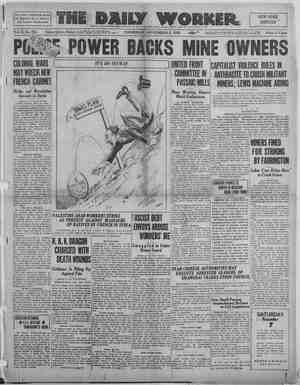The Bismarck Tribune Newspaper, November 5, 1925, Page 3
You have reached the hourly page view limit. Unlock higher limit to our entire archive!
Subscribers enjoy higher page view limit, downloads, and exclusive features.
- THURSDAY, NOVEMBER-5, -1925 FARMER OF KANSAS DIGS OWN GRAVE Decides World Is Too Lazy to Do It After He Dies, So Dees It Himself 5—Twen- en, who "Radisson Is} Namiall For Bismarck Man | es Remedy in the Werld Joint: BASE Sweaters We have a large choice awaiting your.call. THE BISMARCK -TRIBUNE-. | How the League’s Big Stick topped a Balkan War HE OLD WAR-TORN WORLD has swung into a new epoch at last, and a new chapter in human history has begun, say expe- rienced editorial observers as they see two Balkan belligerents actually stop a war at the command of the League of Nations. — [t is taken, too, as a heartening seque! to the peace - pledge of Locarno when a word of command from the League ean quench a flaming fuse of conflict in that ever-menacine powder-magazine of tangled vaca! hates and fierce national rivalrics. , The New, York World declares that “to-day, for the first time within the memory of man, the great Western Powers have stood united on,a Balkan question, and for the first time when they com- manded peace the Balkans obeyed.” The importance of the ultimatum which the League of Nations issued to Greece and Bulgaria can scarcely be exageerated, says the New York Times, which welcomes it as evidence that “we are living in a new epoch” in whieh hereat “the advance of strong and en- lightened nations may be achieved \ mer’ the maiming and slaugh- ter of the nations’ best and bravest.” And, continues the Times: “To-day those of little faith are asking what the authority of the League would have come to if, instead of disarmed Bulgaria and ex- hausted Greece, the belligerents had been Powers of the first order. The answer is the treaties of Locarno.” On the other hand, there is a note of skepticism sounded in some quarters of America. For instance, in the Washington Post we read: “The spectacle of the League of Nations shutting its eyes and ears to the Moroccan and Syrian wars, while forbidding Greece and Bul- garia to fight, isa striking ilumination of the fact that the League is merely a machine for manipulation of European affairs by the Great Powers.” The Literary Digest this week, the November 7th number, is liberally devoted to a comprehensive review of the uprising in the Balkans. It shows what caused it, where the fighting took place, and how and why hostilities ceased so abruptly. By means of transla- tion from new spapers of the affected countries in the Balkans, one is able to obtain a “close-up” of how the peoples of these nations view a security pact against war. These articles are copiously illustrated with cartoons and a map. Prophets and Proofs of Prosperity in America HE BELIEF IN PROSPERITY which sustains the present boom in Wall Street seems to be shared by practically every author- ity in the businesg:and financial world. Sir Robert Horne, a fre: quent visitor here, leaves our shores declaring that'he has never be- fore seen “the rea! prosperity there is to-day in every form of finance, industry, and trade,” a prosperity not confined to the wealthy, but extending to every one, and with nothing in sight that can‘ stop it. of the National City Bank, New York-—and Chambers of Commerce throughout the country, are equally optimistic. But all these prosperity prophecies need tempering with sobri- ety, insists the Newark News, which remarks: “Just what this bally- hoo over long-continued prosperity is all about may be as uncertain as the meaning of Florida’s real-estate boom. As an offset, it re- minds us of statements that we have too many coal- mines and too PAGE. THRE Henry Ford predicts “a century of prosperity.” Elbert us “we are on the verge of a great era of prosperity,’ leaders agree with him. Bank presidents-- H. Gary tells > and other stee! including Pres. Mitchell, many miners, too many textile mills and textile workers, and, with all this, agitation from big employers to let in more workers. So, “all these things introduce a note of sobriety to tone down the exal- tations of the Fords and Mitchells.” Don’t Miss Reading These Articles Also in this Big November 7th Issue ot THE LITERARY DIGEST On Sale To-day—All News-stands—10 Cents A Lively Fight Over Death Taxes The Downfall of Caillaux Postage-Stamps as a National Commodity Visions of the United States of Europe New England Culture Meets the Buzz-Saw Machines with Nimble F ingers The New Books —The Best Books—Read About Them 227: ur INTERNATIONAL BOOK REVIEW Noyember Number. Now Hey Funk & Wagnalls Ganpanes: Publishers + +356 Fourth Avenue, New York, N. ¥.>) Emotions in Men and Women What Makes Caricature Successful? President Coolidge’s Sermon to the Nation Turkish Suspicion of the Y. M. C. A. Is New York a Modern Gomorrah? Reproduction in Colors From the Original Painting by Sir Thomas Lawrence--“‘BROTHERS” Mae Interesting Mlustrations, Including Humorous Cartoons, and Original Maps. ries Siesta | ow to De 1 Personality ar Mei . FREE—CONFIDENTIAL : inf Send a stal or write your son the margin of this ad- and return it to us immediately. i by paatl full information K UNK # WAGNALLS COMPANY (Publishers of the Famous NEW Standard Dictionary) NEW YORK Beasts, Men, Jailbirds and Traitors in Siberia Back to the Wild Buffalo Days Does a Poem a Day Keep Glory Away? Celebrating Oom Paul’s Centenary Cost of Coal Strike Spice of Life HOW TO SPEAK. IN PUBLIC P, about this re- of training. It will show you how it has benefited others—many of them well-known men and women—and how you may become an easy, fluent speaker be- jore one of a thousand persons, Write to-day Fuak & Wagnalis ae Dept. 889 New York Tig,





